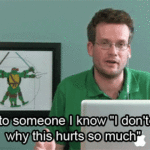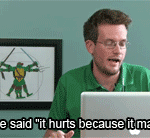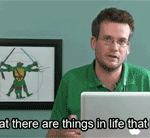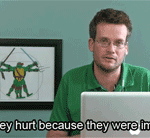THIS IS EVERYTHING.
How does this have 15,000 notes?
Anyway, context: I received this good advice from my chaplaincy supervisor when I worked as a student chaplain at a children’s hospital in 2000. We were talking not about any of the terrible things I’d witnessed at the hospital but about my breakup with my college girlfriend.
One time when I was a chaplain, this especially awful thing happened, and a bunch of us had to attend this post trauma debriefing/group therapy session. (The theory goes that this was a way to prevent or minimize PTSD, I think.) So here is this big group of people—doctors, nurses, social workers, paramedics, etc.—all being forced to attend this group therapy session they don’t particularly want to be at, and the counselor person is asking all of us to recount what happened that night, which no one is particularly inclined to do.
Eventually, I tell a story about my girlfriend: When I came home the morning after this thing had happened, I was really freaking out, and she was not particularly empathetic. This story animates everyone: They all start talking about my girlfriend, and how she’s just like their boyfriend/girlfriend/spouse, and how I should really break up with her, because that’ll show her.
So I did break up with her.
Of course, I immediately regretted it, but once she was free of obligation to me she probably felt tremendous relief and had no intention of re-entangling. (This was very sane and mature of her, in retrospect.) So I spent my days moping around the hospital, not because of the horrible things I’d seen but because I missed this woman so much. And I felt like an idiot being so upset over this girl when there were far worse things happening around me at the hospital every day.
Which just made everything worse: I was sad because I was no longer close to this woman I loved. And then I was ashamed because I felt more upset about my own stupid romantic problems than about the illness and death that was all around me in the hospital. I felt like my problems were silly and small, but they still made me very sad, and I could never seem to get out of that spiral.
All of this combined to make me super annoying to be around. Fortunately, I was surrounded by chaplains, who are basically professionally empathetic, and are required by job description to listen to you.
It was my supervisor who finally helped me understand why I was so sad, and that I should feel sad. So often we try to make other people feel better by minimizing their pain, by telling them that it will get better (which it will) or that there are worse things in the world (which there are). But that’s not what I actually needed. What I actually needed was for someone to tell me that it hurt because it mattered.
I have found this very useful to think about over the years, and I find that it is a lot easier and more bearable to be sad when you aren’t constantly berating yourself for being sad.
Between online-John and author-John (particularly in TFiOS) I just love what he has to say about suffering.
Minimising someone’s pain is so very helpful even if your comment seems to you like it should be comforting. Acknowledging someone’s pain can be among the most helpful things I think.




